Index relies entirely on the support of donors and readers to do its work.
Help us keep amplifying censored voices today.
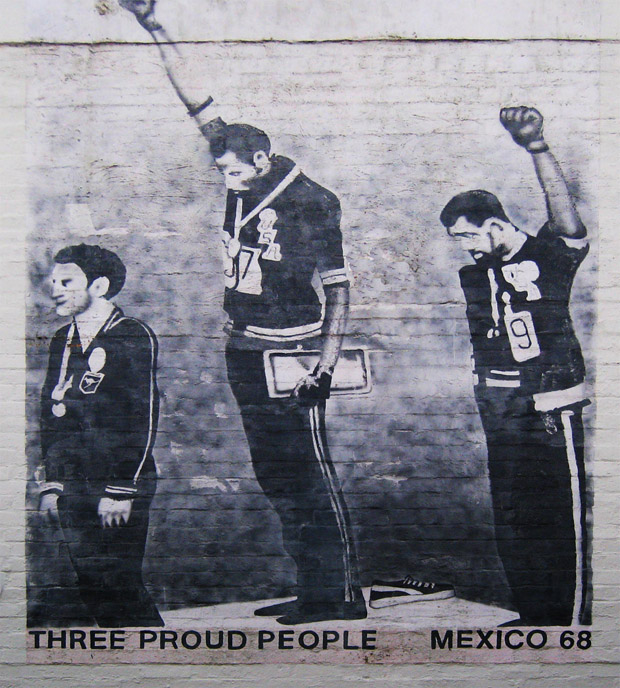
Grafitti of Tommie Smith, John Carlos and Peter Norman showing solidarity for the civil rights movement at the Mexico City Olympics in 1968 (Image: Newtown graffiti/Wikimedia Commons)
Athletes preparing to head off to Sochi Winter Olympics in February, have been reminded that they are barred from making political statements during the games.
”We will give the background of the Rule 50, explaining the interpretation of the Rule 50 to make the athletes aware and to assure them that the athletes will be protected,” said IOC President Thomas Bach in an interview earlier this week. Rule 50 stipulates that ”No kind of demonstration or political, religious or racial propaganda is permitted in any Olympic sites, venues or other areas.” Failure to comply could, at worst, mean expulsion for the athlete in question.
Political expression is certainly a hot topic at Sochi 2014. The games continue to be marred by widespread, international criticism of Russia’s human — and particularly LGBT– rights record. The outrage has especially been directed at the country’s recently implemented, draconian anti-gay law. Put place to “protect children”, it bans “gay propaganda”. This vague terminology could technically include anything from a ten meter rainbow flag to a tiny rainbow pin, and there have already been arrests under the new legislation.
The confusion continued as the world wondered how this might impact LGBT athletes and spectators, or those wishing to show solidarity with them. Russian authorities have for instance warned of possible fines for visitors displaying “gay propaganda”. Could this put the Germans, with their colourful official gear, in the firing line? (Disclaimer: team Germany has denied that the outfits were designed as a protest.)
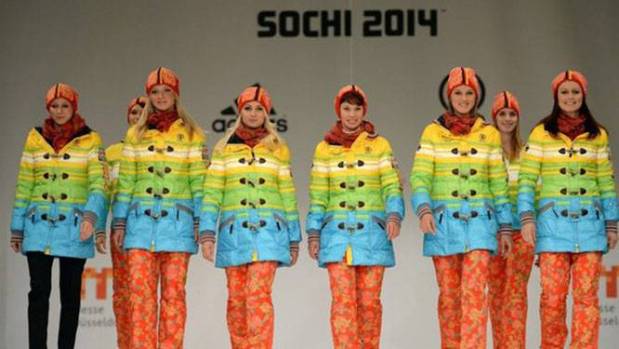
On the other hand, Russian president Vladimir Putin has promised there will be no discrimination at the Olympics, and IOC Chief Jaques Rogge, has said they “have received strong written reassurances from Russia that everyone will be welcome in Sochi regardless of their sexual orientation.”
On top of this, the IOC also recently announced that there will be designated “protest zones” in Sochi, for “people who want to express their opinion or want to demonstrate for or against something,” according to Bach. Where these would be located, or exactly how they would work, was not explained.
But while the legal situation in Russia adds another level of uncertainty and confusion regarding free, political expression for athletes, rule 50 has banned it for years. And for years, athletes have taken a stand anyway.
By far the most famous example came during the 1968 Olympics in Mexico City — American sprinters Tommie Smith and John Carlos, on the podium, black gloved fists raised in solidarity with the ongoing American civil rights movement. The third man on the podium, Australian Peter Norman, showed his support by wearing a badge for the Olympic Project for Human Rights. All three men faced criticism at the time, but the image today stands out as one of the most iconic and powerful pieces of Olympic history.
However, the history of Olympians and political protest goes further back than that. An early example is the refusal of American shotputter Ralph Rose to dip the flag to King Edward VII at the 1908 games in London. It us unknown exactly why he did it, but one theory is that it was an act of solidarity for Irish athletes who had to compete under the British flag, as Rose and others on his team were of Irish descent.
The Cold War years unsurprisingly proved to be a popular time for athletes to put their political views across. When China withdrew from the 1960 Olympics in protest at Taiwan, then recognised by the west as the legitimate China, taking part. The IOC then asked Taiwan not to march under the name ‘Republic of China’. While considering boycotting the games, the Taiwanese delegation instead decided to march into the opening ceremony with a sign reading “under protest”.
The same year as the Smith and Carlos protest, a Czechoslovakian gymnast kept her face down during the Soviet national anthem, in protest at the brutal crackdown of the Prague Spring earlier that year. And that was not the only act of defiance against the Soviet Union. During the controversial 1980 Moscow Olympics, boycotted by a number of countries over the USSR invasion of Afghanistan, the athletes competing also took a stand. The likes of China, Puerto Rico, Denmark, France and the UK marched under the Olympic flag in the opening ceremony, and raised it in the medal ceremonies. After winning gold, and beating a Soviet opponent, Polish high jumper Wladyslaw Kozakieicz also made a now famous, symbolic protest gesture towards the Soviet crowd.
But there are also more recent examples. At Athens 2004, Iranian flyweight judo champion Arash Miresmaeili reportedly ate his way out of his weight category the day before he was set to fight Israeli Ehud Vaks. “Although I have trained for months and was in good shape, I refused to fight my Israeli opponent to sympathise with the suffering of the people of Palestine” he said. A member of the South Korean football team which beat Japan to win bronze at the 2012 London Olympics, celebrated with a flag carrying a slogan supporting South Korean sovereignty over territory Japan also claims.
When the debate on political expression comes up, the argument of “where do we draw the line” often follows. If the IOC is to allow messages of solidarity with Russia’s LGBT population, should they allow, say, a Serbian athlete speak out against Kosovan independence? Or any number of similar, controversial political issues? Is it not easier to simply have a blanket band, and leave it at that?
The problem with this is, as much as the IOC and many other would like it, the Olympics, with all their inherent symbolism, simply cannot be divorced from wider society or politics. The examples above show this. With regards to Sochi in particular, the issue is pretty straightforward — gay are human rights. Some have argued we should boycott a Olympics in a country that doesn’t respect the Universal Declaration on Human Rights, or indeed the Olympic Charter. This is not happening, so the very least we can is use the Olympics to shine a light on gay rights in Russia. At its core, the Olympics are about the athletes — they are the most visible and important people there. It remains to be seen whether any of them will take a stand for gay rights, outside cordoned-off protest areas, in the slopes and on the rink, where the spotlight shines the brightest. And if they do, they should have our full support.
This article was posted on 13 Dec 2013 at indexoncensorship.org
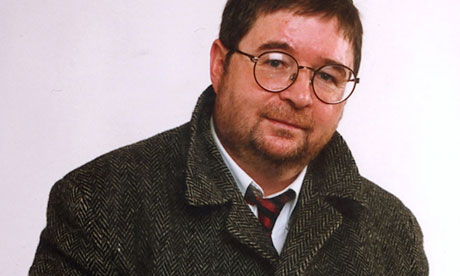
Martin O’Hagan, murdered in 2001
Earlier this week, the Northern Ireland Attorney General John Larkin suggested that investigations and prosecutions for violence carried out during “the Troubles” (that is to say, roughly between 1970 and the Good Friday Agreement of 1998) should be quietly dropped.
The idea, though well meaning, was not well received. Northern Ireland is constantly torn between wanting to forget about the past and requiring justice for history’s victims. It’s unlikely that it can have both at the same time.
The peace process did not bring an end to violence, in spite of the official line. Dissenting groups continued shooting and maiming, albeit in lower numbers.
Among them was the Loyalist Volunteer Force, which, in 2001, took the unprecedented-in-Ulster step of assassinating a journalist.
Martin O’Hagan was an investigative reporter for the Sunday World, an old-style tabloid published in Dublin and Belfast that specialises in stories about gangsters and paramilitaries. As a result, he had been harassed by paramilitaries on all sides, including being kidnapped by the provisional IRA. (He himself had been a member of the Official IRA before giving up on the cause and going into journalism)
O’Hagan had a particular interest in the activities of notoriously violent Belfast loyalist Billy Wright, whom he nicknamed “King Rat”. In 1992, Wright, then a member of the Ulster Volunteer Force, had attempted to have O’Hagan killed. Later, Wright’s splinter group, the Loyalist Volunteer Force, had attacked the Sunday World’s Belfast office.
In 1997, Wright, by then in prison, was killed by rival prisoners in the Irish National Liberation Army (questions remain for some over how the INLA managed to sneak a gun into prison).
Four years later, in 2001, O’Hagan was gunned down. The Red Hand Defenders, an operational name for the Loyalist Volunteer Force, claimed responsibility for the murder.
Twelve years later, no one has been convicted for O’Hagan’s murder. There had been hope that a case could be built against murderers based on a Loyalist “supergrass”, Neil Hyde. But in January, prosecutors dropped the case, citing a risk of basing it on uncorroborated evidence. In September, the case was passed to Northern Ireland’s police ombudsman for investigation. Though O’Hagan’s murder falls outside Attorney General Larkin’s proposed timescale for dropping prosecutions, there seems little prospect of a conviction any time soon
On 23 November, journalists mark International Day To End Impunity, highlighting the remarkable, disturbing frequency with which attacks on reporters go unpunished. It’s very easy to imagine that these are things that only happen in Mexico or Putin’s Russia.
But Martin O’Hagan, a good journalist doing his job of uncovering wrongdoing, was killed in the United Kingdom. And his killers, from the United Kingdom, are still free.
This article was originally posted on 22 Nov 2013 at indexoncensorship.org
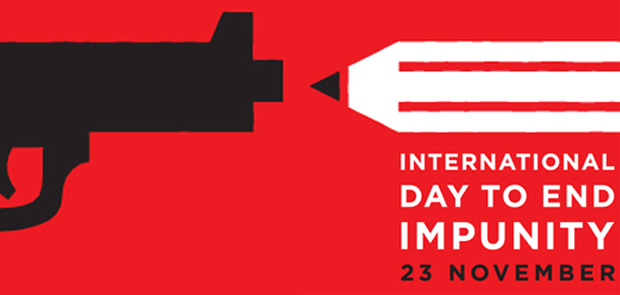
Tomorrow is International Day To End Impunity. “When someone acts with impunity, it means that their actions have no consequences” explains IFEX, the global freedom of expression network behind the campaign. Since 1992, 600 journalists have been killed with impunity — that is 600 lives taken with all or some of those culpable not being being held responsible. Countless others — writers, activists, musicians — have joined their ranks, simply for exercising their right to freedom of expression.
This year has only added to the grim statistics. By the middle of January, six journalists had already been murdered. We are now getting close to the end of 2013, and 73 more journalists and two media workers have suffered the same fate — 48 in cases directly connected to their work, 25 with motives still unconfirmed. Out of these, 15 were killed without anyone — perpetrators or masterminds — convicted.
Russia is notorious for its culture of impunity. In July this year, Akhmednabi Akhmednabiev, a Russian journalist reporting on human rights violations in the Caucasus, was shot dead. In 2009 he had been placed on an “execution list” on leaflets distributed anonymously, and had in the past also received death threats. In January he survived an assassination attempt which local authorities reportedly refused to investigate. His case is still classed as murder with impunity.
Pakistan is also an increasingly dangerous place to work as a journalist. Twenty seven of the 28 journalists killed in the past 11 years in connection with their work have been killed with impunity. In the last year alone, seven journalists have been murdered. Express Tribune journalist Rana Tanveer told Index he has received death threats and been followed for reporting on minority issues. In October, Karak Times journalists Ayub Khattak was gunned down after filing a report on the drugs trade.
In July, Honduran TV commentator Aníbal Barrow was kidnapped together with his family and a driver. The others were released, but after two weeks, Barrow’s body was found floating in a lagoon. He was the second journalists with links to the country’s president Porfirio Lobo Sosa — they were close friends — to have been killed over the past two years. Four members of the criminal group “Gordo” were detained in connection with the case, but at one point, there were at least three other suspects on the run.
In September, Colombian lawyer and radio host Édison Alberto Molina was shot four times while riding on his motorcycle with his wife. His show “Consultorio Jurídico” (The Law Office), aired on community radio station Puerto Berrío Stereo, and often took on the topic of corruption. The Inter American Press Association in October called on authorities to open “a prompt investigation into the murders” of him and news vendor and occasional stringer José Darío Arenas, who was also killed in September.
Meanwhile in Mexico, a country for many synonymous with impunity for crimes against the media, three journalists were murdered in 2013. The state public prosecutor’s offices has yet to announce any progress in the cases of Daniel Martínez Bazaldúa, Mario Ricardo Chávez Jorge and Alberto López Bello, or disclose whether they are linked to their work. Notorious criminal syndicate Zetas took responsibility for the murder of Martínez Bazaldúa and warned the police about investigating the case. He was a society photographer and student, only 22 at the time of his death. Chavez Jorge, founder of an online newspaper, disappeared in May and his body was found in June, but in August the state attorney’s office said they did not have a record of his death. López Bello was a crime reporter who had published stories on the drugs trade.
This year, 20 journalists — from Naji Asaad in January to Nour al-Din Al-Hafiri in September — have also lost their lives covering the ongoing tragedy of the Syrian civil war. Their loved ones, like those of all the civilians killed, will have to wait for justice.
It is also worth noting that while an unresolved or uninvestigated murder is the most serious and devastating manifestation of impunity, it is not the only one. Across the world, journalists are being attacked and intimidated without consequences. In August there was a two-hour long raid on the home of Sri Lankan editor and columnist Mandana Ismail Abeywickrema, who recently started a journalists’ trade union. Despite her receiving threats related to her work prior to the attack, it was labelled a robbery by the police. Bahraini citizen journalist Mohamed Hassan experienced similar incident, also in August, when he was arrested and his equipment seized during a night-time raid. His lawyer Abdul Aziz Mosa was also detained and his computer confiscated, after tweeting about his client being beaten. In October, a group of Azerbaijani journalists were attacked by a pro-government mob while covering an opposition rally in the town of Sabirabad. One of the journalists, Ramin Deko, told Index of regular threats and intimidation.
International Day To End Impunity is a time to reflect on these staggering figures and the tragic stories behind them. More importantly, however, it represents an opportunity to stand up and demand action. Demand that Russia’s President Vladimir Putin, Mexico’s President Enrique Peña Nieto, Pakistan’s President Mamnoon Hussain and the rest of the world’s leaders provide justice for those murdered. Demand an end to the culture of impunity in which journalists, writers, activists, lawyers, musicians and others can be intimidated, attacked and killed simply for daring to speak truth to power. Visit the campaign website to see how you can take action.
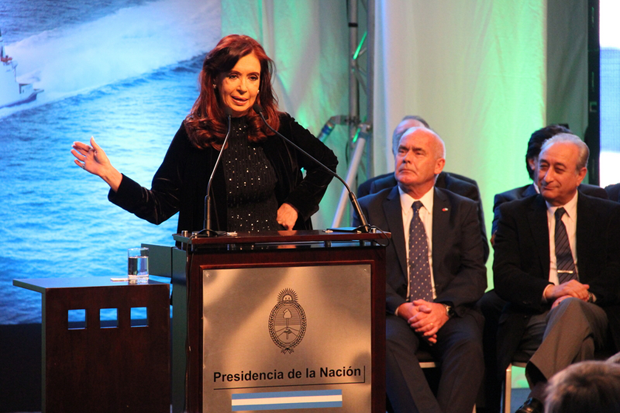
While president Cristina Fernández de Kirchner’s government took a hit during midterm elections, Argentina’s supreme court ruled her restrictions on the country’s media were constitutional. (Photo: Claudio Santisteban / Demotix)
The Argentinian supreme court recently ruled to uphold the country’s controversial media law. The decision represents a big victory for President Cristina Fernández de Kirchner, who argued that the law helps break up the power concentrated in the hands of Argentina’s biggest media conglomerate Grupo Clarín. Opponents, however, says it stifles freedom of expression and press as it would force media companies to sell off some of their outlets. Concerns have also been raised about the law being a way of punishing Clarín, which fell out with the government after negative coverage during tax protests in 2008.
This is only the latest chapter in the ongoing story of the media business in some Latin American countries, with left wing governments and private companies locked in a decade-long fight for control of what will be shown on TV, heard on the radio, printed in newspapers, and posted on websites. New communications laws, persecution of journalists and closure of television networks, however, shows who is really in charge.
Governments like Venezuela and Argentina are waging war against big media companies, while more moderate ones, like Brazil, are using milder means to try and balance the power of communication in their countries. But far from being presented as a straightforward issue of freedom of expression, most of these cases have two opposing and radical interpretations.
On one side, there is the pro-government camp. They believe the governments are democratising the media, which has traditionally been in the hands of the few. In Brazil, for example, eight families control almost 80% of all traditional media companies. The aforementioned Grupo Clarín owns national and regional newspapers, radios, TV channels and more.
Those opposing these measures, however, say they amount to censorship. Again, a good example comes from Argentina: there are some rumours that Kirchner’s administration is trying to suffocate Grupo Clarín by not allowing big chain stores to advertise in their papers. There is also the infamous case of the the closure of Venezuela TV channel RCTVI in 2010.
Both sides talk of freedom of expression, arguing they want to show what is better for the public. But the public – those with the most to benefit from a good and transparent media – are not being allowed to decide for themselves. This is not happening just in Argentina and Venezuela, but across the continent – in Ecuador, Nicaragua and Bolivia, and, albeit in a much gentler way, in Brazil.
Professor Mirta Varela, specialist in history of the media at the University of Buenos Aires, is among those who believe governments are not repressing the big companies or trying to dominate the industry. “The measures taken have shown the political and economic power of the main companies, the spurious origin of their economic growth and their relationship with the dictatorship”, she explains, referencing Grupo Clarín and the military regimes that held power in almost all the Latin American countries from 1960 to 1980. But she also sees some problems with this polarisation: “There is a little room to set a new agenda; to make independent criticism, not overtly for or against the government.”
Cecilia Sanz works for Argentinian TV show “Bajada de línea”, which roughly translates to “Under the Line”. The show is hosted by Uruguayan Victor Hugo Morales, a well-known journalist connected to what Sanz calls “the progressive governments” in Latin America. Here she groups together a number of different left-leaning governments from across the continent – from moderates Lula da Silva and Dilma Rousseff in Brazil, to the more radical Evo Morales in Bolivia and Rafael Correa in Ecuador.
The show comments on the state of the media in Latin America, mainly arguing against the big private companies. “Our main goal is to put in context and show how the media owners have the intention, above all else, to accomplish their economic objectives,” she says. “The are using ‘freedom of expression’ as an excuse for this”. She mentions the case of powerful Mexican TV Azteca, which according to her, supports all the candidates from the hegemonic party PRI, and Chilean paper “El Mercurio”, which used to attack Chilean ex-president Salvador Allende in the 1970s – again putting very different cases in the same group.
The more radical of these “progressive governments” accuse the media industry of trying to destabilise the authorities or to encourage coups d’état. Venezuela’s putsch in 2002 is always mentioned. In this case factions of the media was directly fighting against Hugo Chávez – so Chávez took them off the air.
“This is an insult to the audience because in all of cases it is about the most popular media channels”, counters Claudio Paolillo, president of the freedom of press and expression commission of SIP, Sociedad Interamericana de Prensa (the Inter-American Press Society). “No one has put a gun to the audience’s head to force them to choose what to read, listen or watch, and on what channel.”
Paolillo says the government engages in “Goebbels’ style” propaganda, sustained by public resources, to oppress independent or critic media and journalists. He adds that, ironically, these radical “progressive governments” act like the conservative military regimes of the past. “It is an ideological posture. They want to nationalise communications media as if it was a regular business that offers services or products.”
Paolillo says SIP is against Latin Americas state-controlled monopolies or oligopolies, but reaffirms it is the audience that has the real power to decide what to watch, and where. If they want to watch the same news program, the government shall not interfere. “Unfortunately in Argentina as in Venezuela (and we must add here Ecuador, Nicaragua and Bolivia), governments have created their own media companies, expropriated and bought private ones – in some cases even working through a figurehead”, he complains.
Brazilian political scientist Mauricio Santoro brings up another common problem in the region – organised crime targeting reporters in Mexico and Colombia. But he says this is not a new situation. In his opinion, what is new, is “progressive governments” using the power of the state to control its opponents.
“The alternative proposed by these leftist governments is not based on the construction of an alternative model that privileges pluralism and gives a voice to social and community movements. It is about breaking business groups and giving power to a state press that acts like a government representative and not a public one.”
Worried about the poor quality of the media across Latin America, Santoro suggests the continent needs a more dynamic media, more capable of listening and understanding the true necessities of the people of a region going through “profound change”.
“Looking at the local scene”, he asks, “are we able to find any country where the traditional media meets this expectation?”
Not really.
This article was originally posted on 11 Nov 2013 at indexoncensorship.org